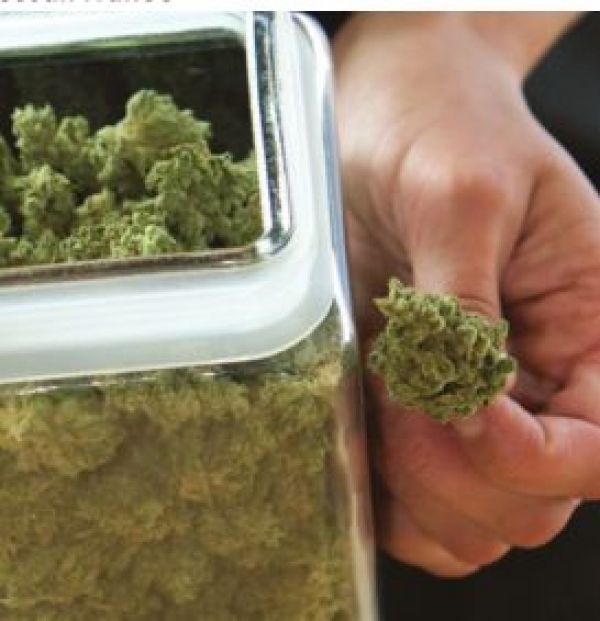
First things first: Kudos to Club Ned and the city of Nederland for opening the first cannabis club in Boulder County last week. One of the downsides to the current law is that people aren’t allowed to smoke cannabis anywhere in public or smoke anything inside enclosed public buildings. Having a place to safely consume cannabis somewhere beyond your own home or your friends’ couches is one of those issues that will need refining as legalization proceeds.
Meanwhile, let’s hope that the creative solution attorney Jeff Gard came up with, aided by Nederland’s government and citizens, will allow adults to consume cannabis in much the same way as they do alcohol and remain within the boundaries of state and local laws. And let’s hope other municipalities will at least consider doing something similar to Nederland in this regard.
In other news, Gov. John Hickenlooper released his initial retail cannabis tax revenue projections. The numbers are staggering, far above earli er estimates: An expected total of $180 million in taxes, with around $100 million of that proposed to be spent over the next year and a half on youth prevention and treatment.
So far so good. Coloradans approved high cannabis sales and excise taxes last year, and part of the legalization effort emphasized keeping it out of the hands of teenagers. We have a duty to educate youth about cannabis so they can make good decisions in their lives, and another to treat individuals who need help with substance abuse.
The bulk of the money in the governor’s plan, a total of $85 million, is proposed to go toward marijuana youth use prevention and substance abuse treatment. That’s a lot of dough. And just as law-enforcement agencies have depended on federal Drug War money for decades, there are a host of agencies and organizations that derive much of their funding from government sources.
One of the things often overlooked about the passage of Amendment 64 is that, for the first time, we actually have the opportunity to begin to talk with teenagers honestly about cannabis’ pros and cons. But I’m wondering whether much of that money will be going to agencies where a discussion about the relative harms of cannabis will be taking place? Or will it go toward con structing a treatment industrial complex to deal with a problem that doesn’t actually exist — the build-it-and-theywill-come approach?
As a professor of psychiatry and director of the Division of Substance Dependence at the University of Colorado-Denver, Dr. Paula Riggs is a popular presence in state cannabis debates and an outspoken voice against legalization. She sits prominently on the board of Smart Approaches to Marijuana, or SAM, the prohibitionist organization founded by Patrick Kennedy after legalization passed in Washington and Colorado, whose philosophy seems to be that the Drug War should continue as is, but the federal government needs to do a better job.
Dr. Christian Thurstone is director of the Denver Health prevention and treatment facility and a member of the SAM board, whose Encompass protocol, developed with Riggs, was created to deal with the perceived overload that legalization is going to create.
Both deny that cannabis has any medical applications whatsoever. Both are vested in prohibition and will be among those eligible for that money. Teen substance abuse is a problem. But these “solutions” sound much like the old Ronald Reagan “Just Say No” or DARE programs that have never worked and never will.
“Any new marijuana education efforts should include a discussion of the relative harms of alcohol and prescription drugs,” said Mason Tvert of the Marijuana Policy Project about the governor’s plans. “We support efforts to educate people about marijuana and prevent use by minors, but not when they are as myopic and wasteful as those proposed by the governor’s office.”
Art Way, who works in the Drug Policy Alliance’s Denver office, voiced a similar wariness. “The concern is that grants provided to school health professionals to deliver education within schools would favor the current prevention and treatment establishment,” he wrote last week on the organization’s weblog. “The end result is a biased approach that fosters fear over knowledge, and we lose the ear and respect of those we most want to reach.”
Fear over knowledge is a pillar of the prohibition movement. Cannabis has been abundantly and cheaply available in Colorado despite decades of the prohibitive policies advocated by Riggs, Thurstone and SAM. Hundreds of thousands of Coloradans have been using it without incident. The only difference now is that the state is taxing and regulating it.
The legislature will ultimately decide how all this money will be spent. No one is suggesting that it not be used for prevention. But can’t we at least funnel it into treatment that emphasizes science and knowledge instead of continuing to fund the war of fear and retribution?
Send tips, suggestions and criticisms to [email protected].
Respond: [email protected]














